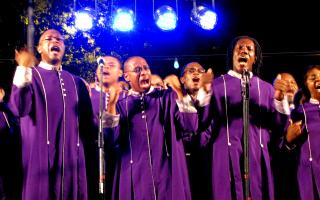A History of a Joyful Noise
This reflection was created for Choir Sunday, an annual tradition at the First Unitarian Universalist Society of Burlington, Vermont. You can adapt the language as suitable for you.
We make Choir Sunday an annual tradition because music does something for religious sentiment and religious expression that words or silence simply can’t. And particularly in our Judeo-Christian tradition, singing — making music with the human voice — goes back as far as we can trace.
When we look in the Bible, for example, one thing we find are Psalms. Psalms are poems, or songs, of praise. And the hundredth psalm begins with these words:
Make a joyful noise unto the Lord, all ye lands.
Serve the Lord with gladness: come before his presence with singing.
[If you wish, note that this is the King James translation.]
In other words, we can enter into divine presence — we can have a sense of the sacred—by joyfully and gladly singing!
This is an inspiring idea, and it inspired a man named William Kethe, who, in the year 1561, decided to make a mini-hymn out of those verses from the hundredth psalm. While keeping the meaning, he changed the words around so that they’d rhyme, and he composed a tune to go with them and he came up with this. [Get a G pitch, and with or without accompaniment, sing Kethe’s doxology with tune #371 from the Unitarian Universalist hymnal, Singing the Living Tradition. You can hear the tune by listening to the MIDI].
All people that on earth do dwell,
Sing to the Lord with cheerful voice;
Him serve with mirth, his praise forth tell;
Come ye before him and rejoice.
You might have noticed the word, “mirth,” a word we don’t use in English much anymore. It means joyfulness and happiness with laughter.
Kethe composed what we refer to as a doxology: a short hymn of priase. How many of you are familiar with this tune? [Ask for a show of hands and expect many.] This tune has had remarkable staying power. It’s been in our western religious culture for some 450 years, and due to its original pairing with Kethe’s text based on the first two verses of Psalm 100, it’s known as the Old Hundredth.
As time went by and people sang this doxology, theological ideas developed and changed. A minister and prolific composer from England, Isaac Watts composed some 750 hymns and put ALL of the psalms to music! Isaac Watts, being a Christian, felt the doxology needed to reference Jesus as well as God, so in 1719 he came up with this version of the doxology, in which God is the Creator and Jesus is the Redeemer:
From all that dwell below the skies
Let the Creator’s praise arise;
Let the Redeemer’s name be sung
Through every land, by every tongue.
Well, after some time, and I’m not sure how long, some Unitarians came to feel that a stirring doxology didn’t need to reference either Jesus or God, so they tweaked Isaac Watts’ words a little and came up with what we have in our hymnals to this day. So pull out a hymnal and find #381. You’ll see that it’s only words, and the tune I’ve been singing is #371. I hope you’ve caught on with the tune, and if not, do your best to flip between words and notes! Notice the essence in these current words for our praise hymn. [Get an intro from the accompanist and sing together #381:]
From all that dwell below the skies
let songs of hope and faith arise;
let peace, good will on earth be sung
through every land, by every tongue.
Now, for some fun, let’s see what one other more contemporary person has done with the doxology. Kenneth L. Patton was a famous Universalist minister of the 20th century. Let’s sing together, back to back, Patton’s doxologies which he composed in 1980:
Let those who live in every land
declare that fear and war are done –
joined by the labor of their hands,
in love and understanding, one.
Ours be the poems of all tongues,
all things of loveliness and worth.
All arts, all ages, and all songs,
one life, one beauty on the earth.
Finally, I’m wondering if any of you have noticed, with these varied doxology texts we have, that they are not all in English. [Pause and wait while people look, and encourage the observation that one is in Spanish.] What are your thoughts, your feelings to see that we have a Spanish doxology in our UU hymnal? [Take a few responses.]
Over one-third of households in America speak Spanish at home. As time has passed, more and more Americans are Spanish-speakers. This says something about where we are going, so we will sing together #382, which is a translation of #381. [Seek a show of hands for who is comfortable speaking Spanish and either you or a pre-arranged pronunciation helper sing each line as an example to the congregation so they can sing it back to practice.] Now, let’s sing the Spanish doxology together, and in the spirit of touching the past and the future in the present moment, feel free to join in adding a final “Amen,” which some of you may hear in your heart’s memories.
De todos bajo el gran sol
surja esperanza, fe, amor
verdad, y belleza cantando,
de cada tierra, cada voz. Amen.
Amen, and praise for singing!
Note
You may want to bring pictures of Isaac Watts and Kenneth Patton; the nature of their portraits reveal something about the times they lived in. (These images aren’t included on this post because of permission limitations.).
| Date added | |
|---|---|
| Tagged as |

